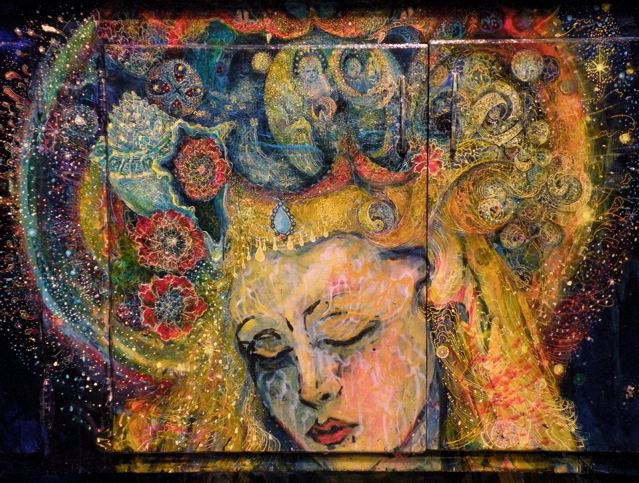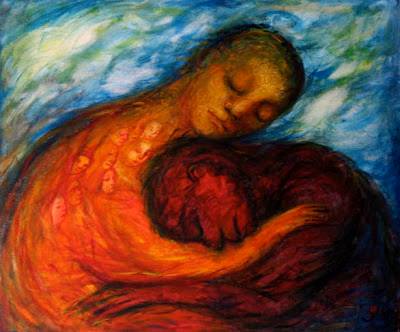Sadness is something many of us try to avoid feeling. However, as with all the pure emotions, we believe it plays an important role in life. The purpose of sadness is to help us release the pain of our loss so that we are free to find new connections and to risk love again. After identifying our loss and allowing our grief to flow we are free to find a joyful or more meaningful way of remembering, and with time to move forward in our life to form fresh connections.
Releasing our sadness grounds us and brings a life giving fluidity. Rather than rigidly ignoring our pain and sorrow and soldiering ever onwards, sadness helps us slow down and soften to the flow of our life. It allows space for us to sit with the realities of life and of human relationships.
When we cry our tears release toxins which otherwise gets stored in our body and can cause pain and ill health. When tears flow freely they leave us feeling lighter, and bring healing by allowing us to let go. They help us mourn and then move to a place where we can eventually find a joyful or more meaningful way to remember, to honour that which we have lost, and stay connected in a rich rewarding way, rather than painful, way. We believe that we are all deeply loving, deeply connected beings and will always remain connected to that which we have lost.  However we have a choice as to whether to remain connected painfully or joyfully.
However we have a choice as to whether to remain connected painfully or joyfully.
Sadness softens us and re-awakens a sense of trust in the flow of time, and in the possibility of healing. This can eventually bring a gentleness and acceptance to the loss so that with time we can transform what has been lost in to a memory that enriches our life. If our sadness does not get a chance to flow then we will maintain a painful or dysfunctional connection to that which we have lost, and we’ll be unable to fully re-engage with life.
.
We believe that if we fully grieve the loss we leave space for a new, more joyful way of remembering to be found, where the good in the connection can be remembered and celebrated. This is particularly important for complicated grief when one can be left with many negative, confusing and painful memories of the person or connection that was lost.
•Loss of a loved one to suicide.
•losing a partner when they have an affair.
•Loss of a loved one when you feel responsible for your parting.
•Loss of a loved one when you feel responsible for their death.
•Loss of your country due to civil war.
It’s important that all the negative emotions, the pain and anger and mixed feelings are fully explored and released so that, with time, it is possible to remember what was meaningful, important or even joyful to us about these connections.
Sadness revitalises and rejuvenates us, connecting us deeply to ourselves, and to our emotions. Nothing has to be ‘done’ for this to happen. The emotion, (and there may be a mixture of emotions as we said earlier, not just sadness), simply needs to be allowed to flow. Although this is ‘simple’ it is not necessarily easy and many of us carry unprocessed grief from losses we have sustained in our life. We will talk further about this in our next two blogs:
–What happens if we repress our sadness?
-When sadness seems overwhelming…
https://exploringtheshadow.co.uk/2014/03/18/what-can-we-do-if-our-sadness-is-overwhelming-or-too-frightening-to-feel/.
.
 “To live in this world you must be able to do three things: to love what is mortal; to hold it against your bones knowing your own life depends on it; and, when the time comes to let it go, to let it go.”
“To live in this world you must be able to do three things: to love what is mortal; to hold it against your bones knowing your own life depends on it; and, when the time comes to let it go, to let it go.”
Exerpt from “In Blackwater Woods” by Mary Oliver, from American Primitive.
“Learning to accept yourself and others. To accept that what you have lost is well and truly lost forever, and that sadness is now your trusted companion. To be courageous, humble, loving and forgiving is no small task. But this is what you are to undertake if you are to find your way out of the prison of depression and never to return to it.”
Dorothy Rowe – on depression
——————————————–
For further information about Healing The Shadow work, including details of group workshops, 1-2-1 sessions, couples work and the practitioner training please visit healingtheshadow.co.uk
Sign up here to receive a monthly newsletter with upcoming workshop information and other Healing The Shadow news.
Watch a video about the Lover Archetype, which is the Archetype which we relate to sadness and grief.


